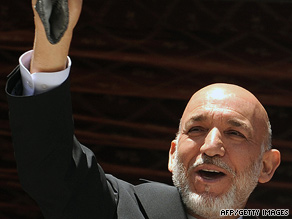
It’s hard to believe, but the people of Afghanistan will go to the polls in just over three weeks to choose their next president. Though the incumbent Hamid Karzai is the clear favorite, but his return to the state’s head office is not assured as challengers Abdullah Abdullah and Ashraf Ghani have gone on the offensive, and there is a laundry list of issues, from corruption, to the rise in violence, to the lack of electricity for them to criticize Karzai’s leadership on. There is a distinct possibility that Karzai will not obtain the 51% majority needed to avoid a runoff and this would open up the possibility that his rivals could all support one opposition candidate.
One specific issue concerning Karzai during the campaign that is especially disconcerting was his no-show at any presidential debates as of yet. Afghanistan is a troubled, young democratic society and denying the Afghan people an opportunity to see political leaders express and argue their views of how they would run the country is unfortunate to say the least. Debates are far from perfect venues for policy discussions, but they do require a certain sense of accountability from the politicians involved.
United States Ambassador to Afghanistan Karl W. Eikenberry appears to also be displeased with the lack of ‘debate’ so far in the Afghan election. In a Monday op-ed in the Washington Post Eikenberry backhandly criticizes Karzai for his debate no-shows, stating the….’Afghan people deserve to know the platforms and implementation plans of each candidate.’ He goes on to list crucial questions that he believes should be being discussed during this election season:
“How will the next president finish building a strong army and police
force respected by the people and fully capable of providing security?
Can the nation’s wealth be used for investment and development in an
accountable manner? How will young people be educated and trained to
develop the human capital that Afghanistan needs to move forward? What
policies will be adopted to encourage the return to Afghan society of
those who renounce ties with international terrorism and the use of
force while accepting the constitution of the nation? What are the
candidates’ ideas for governing Afghanistan; how, for example, should
the provincial councils evolve to give a real voice to Afghans across
the land? And how can the international community better partner with
Afghanistan to achieve peace, justice and economic progress?”
A solid list, but I can think of some others: What should the relationship be between the federal government in Kabul with the provinces, and vice versa? How will the new/continuing government bring electricity to the thousands of Afghans who lack the vital economic resource? To each presidential candidate, Who are the insurgents that can be brought back legitimately into Afghan society and governance and who are the ones that cannot? How do the candidates view the NATO/US force presence? How do they view the working relationship between the Afghan and US government? What role should women play in society and governance? How can they foster better relations with their neighbors, specifically Pakistan, Iran, etc.?
What questions would you ask Karzai, Abdullah, Ghani, etc. if you moderated a presidential debate in Kabul?